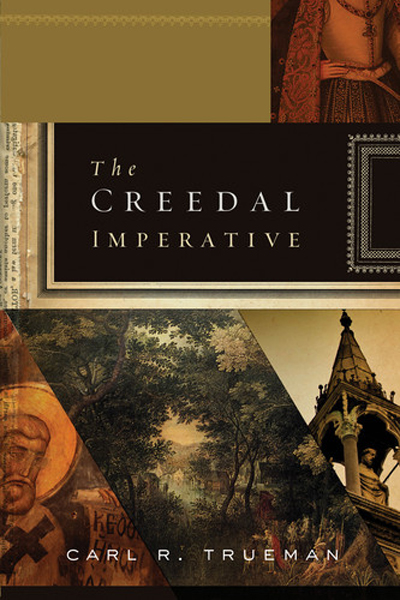
Carl R. Trueman
Reviewed by: David J. Robbins
The Creedal Imperative, by Carl R. Trueman. Published by Crossway, 2012. Paperback, 208 pages, list price $16.99. Reviewed by OP pastor David J. Robbins.
Not long ago I found myself in a messy conversation about the Trinity. As it turns out, talking about divine mysteries becomes vastly more difficult, and biblical orthodoxy more troublesome to parse, when you are unwilling to engage with the historic statements of the church.
My interlocutor claimed "no creed but the Bible." For him, and indeed for anyone suspicious of confessions and the ecclesiastical bodies that hold to them, this book is an eyepopper. Carl Trueman develops an incisive critique of the prevailing anticonfessional bias and a positive argument for the principle of confessionalism—not just as something sensible, but as a biblical necessity. If the subject seems tedious, don't be put off; this is a book that constantly stimulates, frequently scintillates, and occasionally compels a hearty amen!
Chapter 1 exposes how various cultural ideas negatively shape the regard paid to creeds and confessions, often imperceptibly. Three are discussed: (1) Real value is in the next big thing, or whatever comes after that, so the past is radically devalued. (2) Emotions are the locus of truth, and words, including doctrine, are not to be trusted. (3) Traditional forms of external, institutional authority are rejected. These trajectories combine to render confessionalism not only distasteful, but also countercultural. Trueman's analysis here is first-rate, and he interacts with these themes throughout the book.
The second chapter articulates a series of biblically derived positions that together argue compellingly for confessionalism. A superb defense of the vital adequacy of verbal communication is followed by short expositions on human nature, the church as an institution, and the confessional implications of Paul's instruction to "hold fast the form of sound words" (2 Tim. 1:13). Here the author maintains a Pauline creedal sensibility and even the expectation that the church will continue to develop normative doctrinal statements for the stable transmission of truth. The following two chapters helpfully connect this notion with the creeds of the early church and later Protestant confessions.
The remaining chapters emphasize the doxological (and pedagogical) character of confessions as well as the utility of confessional statements for delimiting church power, discriminating between members and office bearers, maintaining corporate unity, etc. An appendix reflects briefly on confessional revisions and supplementation, and, lastly, there is a short but worthwhile guide to further reading.
Many other features of this book stand out; I will mention two. First, the author posits that every Christian has a functional creed, a way of summarizing biblical truth. Unwritten creeds are dangerous because they cannot be evaluated in light of Scripture, the norming norm. Second, I find Trueman's sympathetic approach to anticreedal Christians quite helpful. As he observes, those who are concerned that confessional statements not be granted autonomous authority may in fact share the conviction of our own Confession: that Scripture is the supreme authority by which all creeds and confessions are to be examined (WCF 1.10).
Would I give this book to my confused conversationalist? Probably not; "no creed but the Bible" often translates to "no book," either. But pastors, elders, and all who love and want to grow in their appreciation of confessionalism ought to take it up and read. This book will not only help you respond to those who find creeds distasteful, but will also fuel your joy in the tradition that has been faithfully handed down to us.
November 16, 2025
November 09, 2025
November 02, 2025
October 26, 2025
October 19, 2025
October 05, 2025
Raising Sexually Faithful Kids and
Parenting Boys and Girls in a Gender-Confused World
September 28, 2025
© 2025 The Orthodox Presbyterian Church